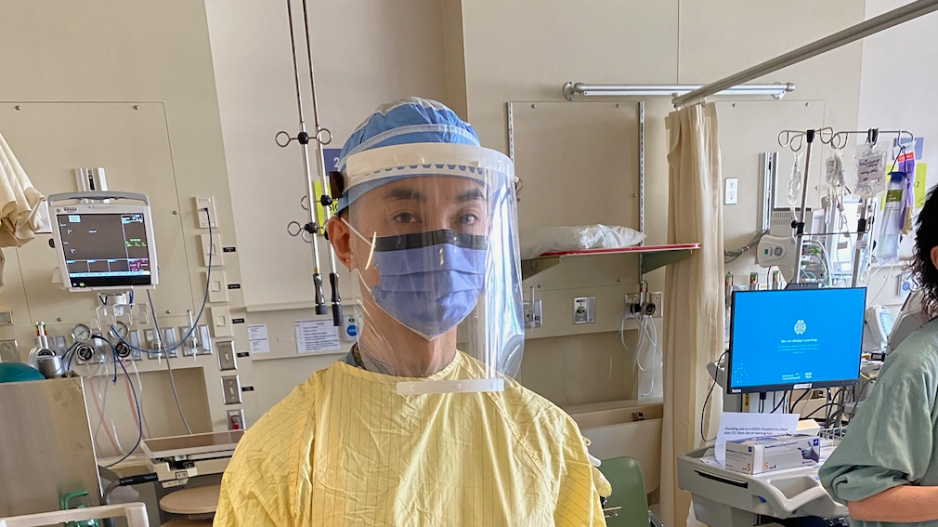The federal government will purchase another $2 billion in personal protective equipment (PPE) as it accelerates efforts to tap domestic industry for more medical supplies.
Prime Minister Justin Trudeau said Tuesday (March 31) his government has secured three contracts and inked letters of intent with five other Canadian companies to boost access to supplies such as masks, face shields, gowns, test kits, hand sanitizer and ventilators.
“We know that the demand for critical equipment and supplies will grow in the coming weeks, so we need a sustainable, stable supply of these products. And that means making them at home and we’re optimistic that they will be available in the coming weeks,” he said during his daily media briefing outside his home in Ottawa.
The prime minister also announced the Hamilton-based Next Generation Manufacturing Canada Supercluster has been deployed to lead companies with developing and scaling up new technologies to test and treat Canadians.
Regarding the $2 billion going towards PPE, bulk purchases would be made on behalf of provinces and territories to be distributed within those jurisdictions.
Some B.C. businesses have already been taking upon themselves to produce protective gear.
Vancouver-based LNG Productions Inc. (LNG Studios) has been running five 3D printers at full capacity to produce 35 face shields each day for local hospitals including Vancouver General Hospital, St. Paul’s Hospital and Richmond Hospital.
The latest announcements from Ottawa follow plans unveiled on March 20, when the federal government launched a program to work with private enterprise to shift manufacturing capabilities and expand production of medical supplies.
At that time, government said it would be looking to the nation’s innovation superclusters — backed by nearly $1 billion in previously announced commitments — to tap into its network of 1,800 members to come up with ways to address the pandemic.
While the Ontario supercluster is taking the lead on manufacturing, the Vancouver-based Digital Technology Supercluster already has $153 million earmarked from Ottawa to stoke private industry and post-secondary collaborations on digital products that can be commercialized.
“We have been encouraged and mandated by the Government of Canada to explore how we can take a leadership role in addressing the COVID-19 environment,” CEO Sue Paish told Business in Vancouver.
The West Coast supercluster had 30 projects in the works prior to the call from government.
“We were, I will say, ahead of the ask. We were developing a pipeline of potential projects that could address specific issues relevant to COVID,” Paish said.
“These started to come in the day that people started to realize the COVID environment was going to be significant for Canadians.”
Projects range from developing platforms to help deal with mental health issues and rebuild community engagement, to data sharing related to the genes of the virus.
Ottawa is also redirecting its Strategic Innovation Fund to deliver direct support to larger companies and research institutions, while the National Research Council is expediting research and development for small and medium-sized enterprises.
Innovative Solutions Canada is assisting companies commercialize products faster as part of the program.
Meanwhile, Trudeau said March 30 that he’d have more to share on ongoing safety concerns tied to construction of the $12.6 billion Trans Mountain pipeline expansion.
When prompted by reporters March 31, the prime minister said he’s confident all Crown corporations maintain proper safety standards.
Trans Mountain Corp. maintained in a March 30 statement its first priority is the health and safety of its workforce and their families, “while ensuring the uninterrupted safe operation of the Trans Mountain Pipeline and the continued, safe construction of the Trans Mountain Expansion Project.”
Trans Mountain Corp. CEO Ian Anderson said the company is “continuously assessing” the unprecedented situation brought on by the pandemic.
“We are well underway with project construction in several areas of B.C. and Alberta and we plan to continue construction as long as we can do so in a way that protects all of our people and the broader community,” he said in a statement.
“We are confident we have executed all the requirements of health authorities and governments and we are continuing to build on those safety measures at all our work and operations sites.”
The company said it’s staggering shifts to minimize the number workers on any given worksite, staggering lunch and coffee breaks to minimize the size of gatherings, boosting the availability of sanitation supplies on worksites and reducing the number of people travelling together in vehicles.
Anderson added if there is an escalation in guidance from health officials or if the company no longer believes it can provide a safe work place, Trans Mountain would initiate stand-down procedures.
The company is also monitoring potential interruptions to its supply chain amid the pandemic.




